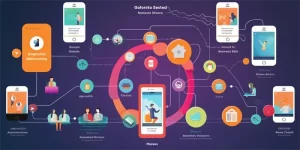Artificial Intelligence (AI) has revolutionized numerous industries, and one sector that stands to benefit significantly is healthcare. The integration of AI into healthcare systems has the potential to transform the medical industry, improving patient outcomes, enhancing efficiency, and enabling personalized medicine. In this article, we will explore several key aspects of AI in healthcare and its impact on the future of medicine.

1. Medical Diagnosis and Imaging
AI algorithms can analyze medical images and assist in diagnosing diseases with greater accuracy and speed than traditional methods. For instance, computer-aided diagnosis (CAD) software can detect abnormalities in X-rays, mammograms, and MRIs, aiding radiologists in making more precise diagnoses. Furthermore, AI-powered image analytics algorithms can learn from vast amounts of data to recognize patterns and predict disease risks, aiding in early detection and prevention.
In addition, AI can assist in pathology analysis, where algorithms can examine tissue samples for signs of cancer or other diseases. By leveraging deep learning algorithms, AI can provide highly accurate and efficient diagnoses, reducing reliance on human experts and increasing patient throughput.
2. Precision Medicine
AI enables precision medicine, which tailors treatments to individual patients based on their unique genetic makeup, lifestyle, and environmental factors. Machine learning algorithms can analyze large-scale datasets, considering various parameters such as genomic data, clinical records, lifestyle information, and treatment outcomes, to develop personalized treatment plans.
This approach leads to more effective treatments and better patient outcomes. AI algorithms can identify patterns in patient data to predict treatment responses, identify potential adverse effects, and recommend targeted therapies. Ultimately, precision medicine holds the promise of maximizing treatment efficacy while minimizing side effects.
3. Drug Discovery and Development
Developing new drugs is a time-consuming and costly process. However, AI can significantly accelerate the drug discovery and development pipeline. Machine learning algorithms can analyze vast amounts of biomedical data, including research papers, chemical structures, and genetic data, to identify potential drug targets and predict drug efficacy.
AI-powered algorithms can also simulate and model drug interactions, helping researchers identify potential risks and optimize drug formulations. By streamlining the drug discovery process, AI has the potential to bring new treatments to market faster and at a reduced cost.
4. Remote Patient Monitoring
AI technologies can enable remote monitoring of patients, enhancing access to healthcare and reducing the burden on hospitals and clinics. With wearable devices and sensors, AI algorithms can continuously monitor patient vital signs, detect anomalies, and alert healthcare providers in real-time.
These devices can track various parameters, such as heart rate, blood pressure, glucose levels, and sleep patterns, providing valuable data for early intervention and preventing hospital readmissions. Remote patient monitoring improves patient outcomes, reduces healthcare costs, and allows for better management of chronic conditions.
5. Virtual Assistants and Chatbots
Virtual assistants and chatbots powered by AI are increasingly being utilized in healthcare settings to enhance patient care and improve operational efficiency. These AI-powered tools can assist patients in scheduling appointments, answering common medical questions, and providing personalized health recommendations.
Additionally, virtual assistants can ease the burden on healthcare professionals by handling administrative tasks, such as updating electronic health records and managing appointments. This allows healthcare providers to focus more on patient care and improves overall efficiency in healthcare facilities.
6. Data Security and Privacy
While the potential benefits of AI in healthcare are vast, ensuring the security and privacy of patient data is paramount. Healthcare organizations must implement robust data protection measures and adhere to strict regulations. AI algorithms should be designed with privacy in mind, with encryption and anonymization techniques applied to sensitive patient data.
Furthermore, access control mechanisms and audit trails should be implemented to track data usage and detect any unauthorized access. By prioritizing data security and privacy, healthcare providers can harness the power of AI while building trust with patients.
7. Ethical Considerations
As AI becomes more prevalent in healthcare, several ethical considerations arise. For instance, the responsible and fair use of AI algorithms should be ensured to prevent biases or discrimination in healthcare delivery. Transparency and explainability of AI algorithms are crucial to build trust among patients and healthcare professionals.
Additionally, the impact of AI on employment in the healthcare sector must be carefully managed. While AI can automate certain tasks, healthcare providers must ensure that the human touch and empathy in care delivery are not compromised.
8. Integration Challenges
Integrating AI into existing healthcare systems can pose challenges, including system compatibility, data interoperability, and user acceptance. AI solutions must seamlessly integrate with electronic health record systems, medical devices, and other healthcare technologies.
Moreover, healthcare professionals should be adequately trained to understand and effectively utilize AI tools. AI implementation should be accompanied by comprehensive training programs to ensure successful adoption and utilization across healthcare organizations.
Frequently Asked Questions:
Q1: Will AI replace doctors and healthcare professionals?
A1: AI will not replace doctors and healthcare professionals but rather augment their capabilities. AI can assist in diagnosis, treatment planning, and administrative tasks, allowing healthcare professionals to focus more on patient care.
Q2: Can AI algorithms be biased in healthcare?
A2: Yes, AI algorithms can be biased if trained on biased datasets. It is crucial to ensure diverse and representative datasets and regularly audit AI algorithms to detect and mitigate biases.
Q3: Is AI affordable for smaller healthcare organizations?
A3: The cost of implementing AI solutions can vary depending on the organization’s size and requirements. However, as AI technologies advance, they are becoming more accessible and affordable for smaller healthcare organizations.
References:
1. Topol E. J. (2019). High-performance medicine: the convergence of human and artificial intelligence. Nature medicine, 25(1), 44?6.
2. Beam, A. L., & Kohane, I. S. (2018). Big data and machine learning in health care. JAMA, 319(13), 1317-1318.
3. Obermeyer, Z., & Emanuel, E. J. (2016). Predicting the Future–Big Data, Machine Learning, and Clinical Medicine. The New England Journal of Medicine, 375(13), 1216-1219.








